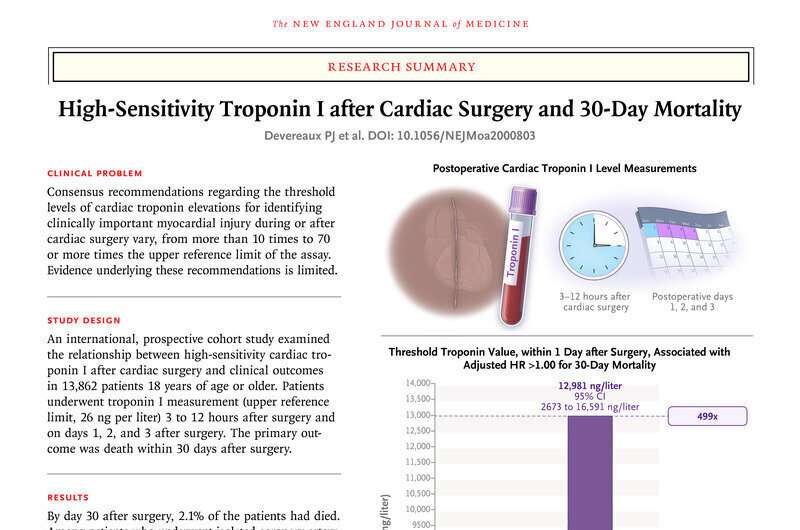Major bleeding reduced in patients having non-cardiac surgery

A large, international study found a drug that helps the blood to clot reduced life-threatening, major and critical organ bleeding in patients undergoing non-cardiac surgery—without increasing major vascular complications.
The drug tested, tranexamic acid (TXA), was given to patients at risk of bleeding or vascular complications. The study found that TXA did not increase deep vein clotting known as VTE, heart attack, non-hemorrhagic stroke, or other major vascular complication in the 30 days after surgery.
In the study, half of 9,535 patients in 22 countries were randomly assigned TXA, half placebo. Patients were 45 years or older (average age 69 years); 44% of them were female.
The study was published today in the New England Journal of Medicine, and simultaneously presented at American College of Cardiology's ACC 2022 conference by senior author P.J. Devereaux.
"Bleeding is a common problem in patients undergoing noncardiac surgery and it often results in patients requiring a blood transfusion. Our study demonstrates that tranexamic acid can prevent this problem," said Devereaux, a senior scientist at the Population Health Research Institute of McMaster University and Hamilton Health Sciences (HHS).
"Additionally, our finding of a safe, effective reduction in surgical bleeding has the potential to help healthcare systems on a broader, trickle-down effect."
"Surgical bleeding accounts for 40% of all transfusions, and more blood products are needed than are available today around the world," added Devereaux, who is also a professor of medicine and of health research methods, evidence and impact at McMaster, and a cardiologist and perioperative care physician at HHS.
"Reduced bleeding that's safe for patients could address the challenge of insufficient blood supply and save more lives."
"In our trial, tranexamic acid demonstrated a consistent reduction in the risk of bleeding based on several definitions, and it reduced the risk of receiving 1 or 2 to 4 transfusions," says PHRI scientist and study co-author Maura Marcucci.
"Given that 300 million surgeries occur annually around the world, tranexamic acid has the potential for large public health and clinical benefits," added Marcucci. She is an assistant professor of medicine and of health research methods, evidence and impact at McMaster, and an internal medicine physician at HHS.
More information: P.J. Devereaux et al, High-Sensitivity Troponin I after Cardiac Surgery and 30-Day Mortality, New England Journal of Medicine (2022). DOI: 10.1056/NEJMoa2000803




















